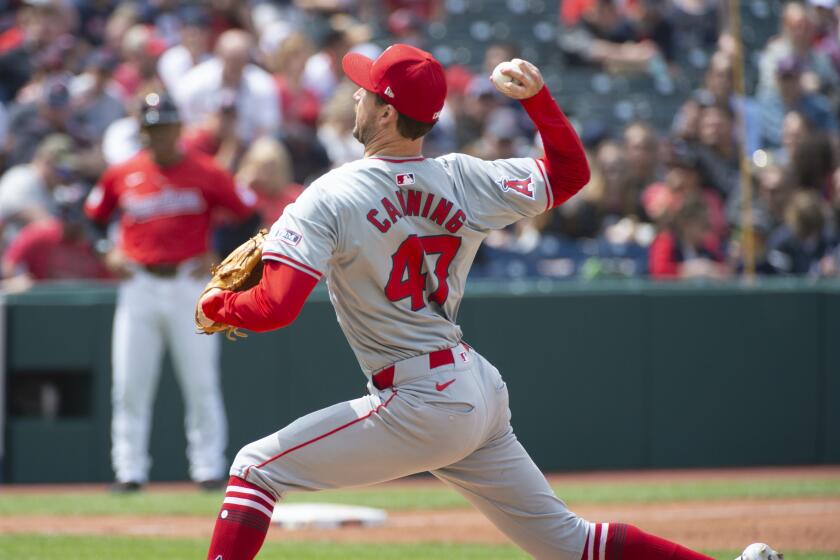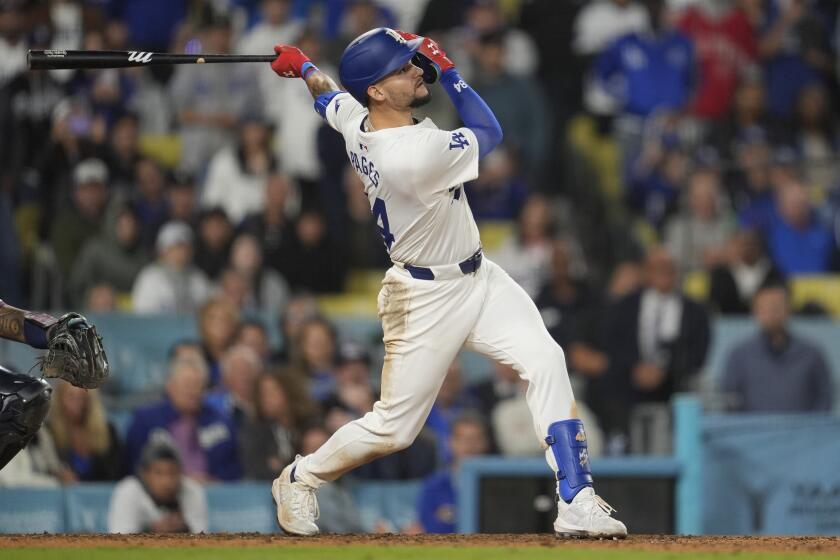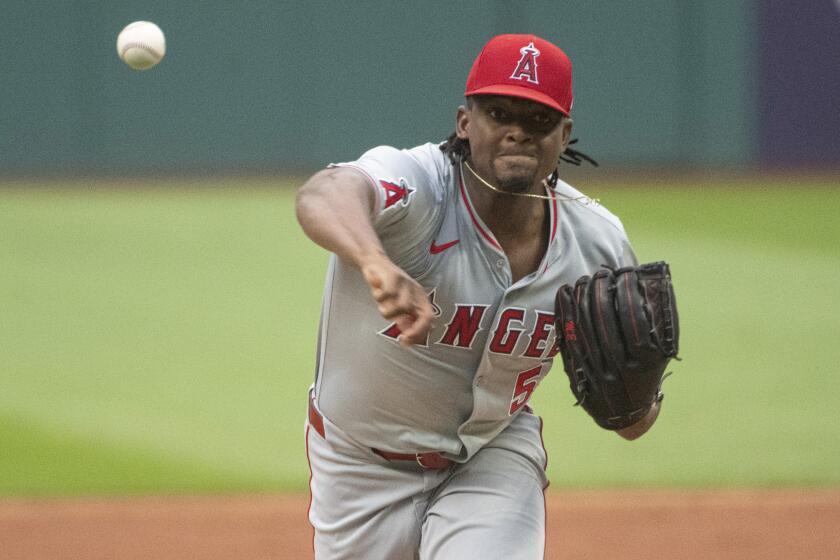Really Bad Is Good Enough in This Division
In British soccer, they call it the second division, the place where the weakest clubs are banished, a sort of purgatory for those teams not quite good enough to compete with the elite but not quite bad enough to disband altogether.
In American baseball, they call it the American League West.
They are virtually one and the same, except for one minor, yet crucial, difference:
In British soccer, no one from the second division is eligible for the postseason championship tournament. The best a team can hope to do is play well enough this year to earn admittance into the first division next year.
Not so in the American League West, and this frightens a good many people.
Someone in the American League West will participate in this year’s major league baseball playoffs. It doesn’t matter how badly the Angels, the Athletics, the Mariners and the Rangers play. It doesn’t matter how many games they lose.
80?
90?
100?
Go, teams, go.
Whoever loses the least gets the chance to lose a few more come October. Whoever loses the least will be christened an American League semifinalist, granted the same status as, say, the Blue Jays, White Sox and Yankees. It’s in the rules.
At the moment, the pole position in the American League West belongs to the Angels, on pace to lose 94 games this season. That nudges them ahead of Seattle, which is on pace to lose 99 games this season, and Oakland, on pace to lose 105, and Texas, on pace to lose 111.
They aren’t playing baseball in the American League West--that’s been obvious since opening day--they’re playing golf. Hacker golf. Shoot a 94, make the cut. Shoot a 94, take some money from the other three stiffs.
What’s your handicap?
In the American League West, nobody has to ask, because everybody already knows.
This is life inside baseball’s Bermuda Triangle:
The other night in New York, the Angels are smoked by the Yankees, 11-1. Just pounded. Angel starter Mark Leiter serves up seven runs in three innings, including a grand slam to the Yankees’ backup catcher. Angel reliever Bill Sampen gets three outs and lets four more runs in. Three Angel fielders commit errors. It was the low point of a 3-5 East Coast trip for the Angels, their fourth loss in a row, dropping their season record to 8-12.
And how does Buck Rodgers, the Angel manager, respond?
By emptying the bat rack and slinging lumber, three by three, onto the field?
By dismantling the dugout water cooler?
By resurfacing the clubhouse floor with what was supposed to be the postgame spread?
No, Rodgers sits in his office and chats calmly with sportswriters.
“I’ll tell you what,” he tells them, “I sure feel better about our club now than at any point I ever did last year.”
Of course he does. Last year, an 8-12 pace, a .400 winning percentage, would have put the Angels 29 games behind first-place Chicago and 19 behind third-place Kansas City over the course of an entire season.
This year, Chicago and Kansas City play in the American League Central.
This year, 8-12 on the last Tuesday morning of April leads the American League West.
Realignment is to blame for this. Realignment and geography. Combined, they conspired to take baseball’s four existing divisions, chop them up and turn them into five divisions and one subdivision.
It’s not the fault of the western United States that none of its American League teams can hit, catch or throw a baseball in 1994. It just worked out that way.
Once, the A’s won three consecutive World Series titles.
Once, the Angels won three division championships in eight years.
Once, the Rangers and the Mariners . . . well . . . all right, the everything-comes-around argument had to end somewhere.
Many preseason publications predicted that the Mariners would finish first in the American League West, on the supposition that somebody had to. But this overlooked a Seattle bullpen led by one Bobby Ayala, who now leads Seattle relief pitchers with one save.
Welcome to the club, Bobby. Billy Taylor, a 32-year-old rookie, also leads the Oakland bullpen with one save. (Dennis Eckersley has blown all three of his save opportunities.) Tom Henke has two saves for Texas. Joe Grahe, Angel closer by default, has four saves--or as many as the rest of the division combined.
The Rangers’ chances have been dashed by moving into a new ballpark, which has been named, rather colorfully, The Ballpark, while forgetting to bring The Pitching Staff with them. Ace starter Kevin Brown is 0-4 with an ERA near 11. The team ERA is approaching seven. And those new red uniforms complete the look--recalling the Rangers’ past incarnation as the Washington Senators, the Dick Bosman years.
In Oakland, the deterioration has been sad to watch. Three seasons ago, it was McGwire and Canseco; now it’s Berroa and Noboa. Stan Javier, who sat the bench for the Angels, now bats leadoff for the A’s. You look at a box score today and you scratch your head. Brumley, Brosius, Bordick. Who are these guys? And when does Sandy Alderson get back from sabbatical?
Thus, first place is left to the Angels, 9-12 as they return home tonight, with $27 million tied up in two disabled starting pitchers--Mark Langston and Joe Magrane--along with two rookies platooning at catcher and another, Brian Anderson, anchoring the rotation.
“How do you get to be in a division like that?” Yankees outfielder Luis Polonia wants to know.
Polonia was an Angel until last winter, so he shouldn’t have to ask.
All he had to do was re-sign.
More to Read
Go beyond the scoreboard
Get the latest on L.A.'s teams in the daily Sports Report newsletter.
You may occasionally receive promotional content from the Los Angeles Times.




